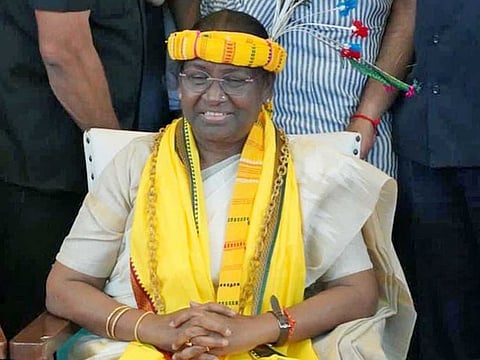India presidential polls: How BJP caught the opposition napping
It showed that opposition parties continue to be a disunited, directionless force

When India’s ruling Bharatiya Janata Party (BJP) announced Droupadi Murmu as the presidential candidate of the National Democratic Alliance (NDA), there were no gasps of surprise. That’s because Murmu’s name had done the rounds back in 2017 as well, and rumours that she was being fielded this time had been very strong for many months. As a tribal woman candidate, Murmu fits the political bill very well for the BJP, and her candidature ended up stumping the opposition again.
Today, the opposition candidate Yashwant Sinha has become an increasingly lonely figure, with many opposition parties abandoning him.
Astonishingly, opposition parties had no idea Murmu was a likely choice for the BJP. It is clear they had not done their homework, settling on former Union Minister Sinha. The way the opposition even met to choose a candidate is a story in itself.
The BJP had the edge from the beginning, but it became a test case for optics, especially for the opposition, and a test of its unity ahead of the 2024 general elections.
Mamata Banerjee took the lead in calling a meeting of parties, determined to show she would take charge. Sources tell me that at the meeting, confusion ensued. Mamata had only one name initially — Sharad Pawar. She announced it, but he politely declined. Surely some homework could have been done before the meeting to ensure Pawar was okay with this. After that, there was an awkward back and forth.
Eventually, two more names were rolled out — former governor and Mahatma Gandhi’s grandson, Gopal Gandhi, and former Jammu and Kashmir Chief Minister Farooq Abdullah. First Abdullah and then Gandhi declined within days, again exposing the lack of preparation by the opposition.
Eventually, they settled on Yashwant Sinha.
Sinha has tried to make this an ideological battle of upholding constitutional values and reminding people of what it truly means to be a democracy. Those are all noble goals, but the opposition campaign fizzled once Murmu’s name was out.
Today, even Mamata says there could have been a consensus on Murmu’s name if the BJP had reached out. How does that look for opposition unity? And how is that supposed to make Yashwant Sinha feel? The Trinamool Congress (TMC) asked him not to campaign in Bengal since their votes were a given anyway, but reports say it has more to do with the political optics of taking on a tribal woman candidate.
The TMC fears that going all out against Murmu might alienate tribal voters in West Bengal ahead of the panchayat elections next year and the 2024 Lok Sabha polls. Tribals constitute 7-8 per cent of the state’s population and are a deciding factor in 47 assembly seats and seven Lok Sabha constituencies.
The Shiv Sena has also broken ranks with its allies in Maharashtra and will support Murmu too. Another opposition leader, the JMM’s Hemant Soren, has no choice but to follow, given Murmu’s background.
Also Read: Shinzo Abe: India’s friend in Japan
The BJP was also smart to choose a tribal woman from Orissa. It also meant that Naveen Patnaik’s hand was immediately forced.
If the run-up to India’s presidential election is anything to go by, the country’s opposition parties continue to be a disunited, directionless force, unable to even come together for a symbolic exercise.
The election for the President of India was never really a tight contest. The BJP had the edge from the beginning, but it became a test case for optics, especially for the opposition, and a test of its unity ahead of the 2024 general elections.








